From: Anuttama devi dasi <anuttamadd@gmail.com>
To: Anuttama devi dasi <anuttamadd@gmail.com>
Subject: "Where is the Outrage", may be published freely

"Lord Jesus Christ, he was not fearful. When he was punished to be crucified, he never cared for it."
--------------------
"This is the nature of demons. Jesus Christ also was killed by the sura-dviṣām, those who were envious of him."
----------------
"And Lord Jesus Christ was killed. So they may kill me also."
-----------------------
"...they feel that they have become more than their guru and then the policy is kill guru and be killed himself."
--------------------------------------------
"That is my only request, that at the last stage don't torture me and put to death."
---------------
"Don’t move me to the hospital. Better kill me here."
---------------------------
"Someone says that I’ve been poisoned."
--------------------------------------------------------
"In the Bhagavad-gītā you will find that one has to attain to that stage—no fearfulness. Fearfulness is due to our absorption in the material consciousness.Bhayaṁ dvitīyābhiniveś
 Lalita is one of the principal eight sakhis of Srimati Radharani in Vrindavan. It means “playful and charming”. Srimati Radharani is also called as Lalita”. She is a very dear friend of Radha-Krsna. Lalita-sakhi and her assistants incarnate from time to time in the material realm to propogate the topmost mood of serving Radha-Krsna, namely to become a maid-servant of Srimati Radharani.
Lalita is one of the principal eight sakhis of Srimati Radharani in Vrindavan. It means “playful and charming”. Srimati Radharani is also called as Lalita”. She is a very dear friend of Radha-Krsna. Lalita-sakhi and her assistants incarnate from time to time in the material realm to propogate the topmost mood of serving Radha-Krsna, namely to become a maid-servant of Srimati Radharani.
Rupa manjari (Rupa Goswami) is the assistant and follower of Lalita-sakhi; thus all who consider themselves as Rupanuga bhaktas (followers of Rupa Goswami) are ultimately the servants of lalita-devi and thus through the media of the parampara should always be longing to engage in the service of her lotus feet. When that day comes that we are able to please her, she will engage us in the intimate loving service of Sri Sri radha-Krsna according to our heart's desire.
Lalita-sakhi incarnated as Svarupa Damodara in the pastimes of Lord Gauranga Mahaprabhu and acted as his personal secretary. "Sri Svarupa Da
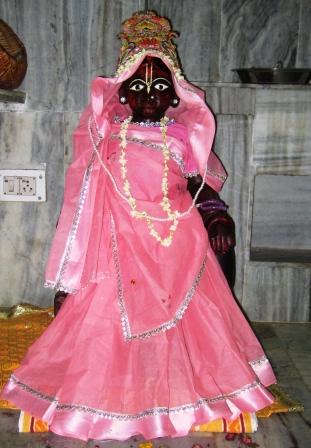
According to Gaura-Ganodesha-Dipika, Shri Sita Thakurani is Yogamaya. The Gaura-Parshada-Charitvali says that in Krishna Lila, she was Purnamasi, the mother of Sandipani Muni, grandmother of Madhumangal and Nandimukhi and a disciple of Narada Muni. (Gaura-Ganodesha-Dipika, however, says that Paurnamasi in Krishna-lila became Shri Govinda Acharya in Chaitanya lila.) (In the image: Deity of Shrimati Purnamasi, Shri Vrindavan Dham).
Śrī Raghunātha –
the Pinnacle of Abnegation
by Śrīla Bhaktisiddhānta Sarasvatī Ṭhākura Prabhupāda
In this world, we find two ways to earn knowledge about a particular object. One is to make an attempt for it with the help of our experience with the world. The other is this: realizing the inefficiency of the worldly experience, to entirely surrender ourselves to the personage who has come from the very realm we wish to earn knowledge about. We may then acquire that knowledge from him, through our ears.
Someone may question, “We are inhabitants of this world. How, after fully relinquishing our worldly experience, can we take refuge of some super-mortal being?” In answer, consider this: it will not do to fear the difficulty of such a task. One who wishes to know the truth should have great strength of mind, for you cannot learn to swim if you become afraid upon seeing water. Self-surrender is not a very difficult thing; rather it is very natural and easy for the soul. That which is cont
Idagunji Ganapathi
A little known account of the divine origin of Lord Ganesha
This description of the appearance of Lord Ganesha is given in Ganapati Khanda of Brahma-vaivarta Purana. The popular story of how Mother Parvati created Lord Ganesha from her cosmetics is given in Rudra-samhita, Kumara Khanda of Shiva Purana, where Lord Brahma confirms the version presented below. The different versions mentioned in the Puranas are due to variation in pastimes that took place in different yugas.
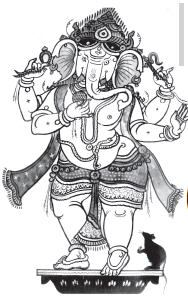
Srila Narada Muni inquired Lord Narayana about Ganesha’s birth and his qualities.
Lord Narayana explained that after the birth of Kartikeya the commander-in-chief of the demigods mother Parvati requested Lord Shiva for one more son. On the request of his beloved wife, Mahadeva asked her to perform a punyaka ceremony (vrata) to Lord Krishna. The procedures include singing kirtana, offering bhoga,flower garlands, Tulasi lamps to Lord Hari.
After explaining the details, Lord Siva, who can award the fruit of

Shyamasundar Dasa : I remember one time in Mexico somebody had given Prabhupada a room. A nice, simple, but very clean room in a Mexican home, and he had gone in for a nap after lunch. And about an hour or so later, he rang his little bell, and I came. He was sitting on the end of his bed staring at this crucifix on the wall with this tortured picture of Christ, and there were a couple of tears coming out of Prabhupada's eyes. And he said, "Shyamasundar, would you please remove this? They have killed their spiritual master so that they can sin."
Gurukripa speaks out after 30 years silence...
Gurukrpa: What Really Happened in 1977-78
BY: BHAKTA DASA
Feb 04, INDIA (SUN) - Another point of view from Gurukrpa Prabhu.
Dear Prabhus: Gurukrpa is here with me and on his behalf I am writing here.
Question: What happened the final months of Srila Prabhupada's appearance in connection with the process of initiating new devotees?
Gurukrpa: Nothing happened. In the beginning Srila Prabhupada did the diksa, the yajna and the name giving. As the numbers increased, he authorized GBC, and senior sannyasis to pick names and chant on the beads, etc.
In 1977 during the months of May, June, July 1977 I was in Vrindaban with Srila Prabhupada
The Jew acarya-killer cabal thinks they won by stealing Srila Prabhupada's Temples, followers, money etc. But we will kill all of them, and take back what is Prabhupada's. Who laughs last laughs best.

"So here is the thing, you see, that Krsna does not say that "You become a nonviolent." No. Never says that. When there is a question of fighting for the right cause, you must fight. There is no question of becoming nonviolent. You see?"
"So Kṛṣṇa has enemies. Arisudana. And He has to kill them. Kṛṣṇa has got two businesses: paritrāṇāya sādhūnāṁ vināśāya ca duṣkṛtam [Bg. 4.8]. Miscreants... They are miscreants. The demons who challenge Kṛṣṇa, who want to compete with Kṛṣṇa, who want to share with the property of Kṛṣṇa, they are all enemies of Kṛṣṇa, and they should be killed.....So real guru is never to be killed, but the so-called guru has to be killed. The so-called, pseudo guru, false guru, he should be killed." Bhagavad-gita 2.4-5 -- London.
"Unfortunately, when the acarya disappears, rogues and nondevotees take advantage and immediately begin to introduce unauthorized principles ............The acarya, the authorized representative of the Supreme Lord, establishes these principles
Srimaya Das They did poison Srila Prabhupada so remember not to surround yourselves with Jews who will flatter you then poison you!
Kike Michel Thats true . . .They ( iskcon rascals ) poisoned a friend of mine named Harivamsa dasa. In a temple named new vrndavan in Gadalajara, Mexico. This year. He was murdered by ISKCON. 2017 https://www.facebook.com/harivamsa.das?ref=br_rs

HARIVAMSA DAS .... This Harivamsa
Was my friend
For many decades
He was an honest men
Not a pedophile
Not a thief
He was the formal president of this hare krsna temple named new vrndavana
For soo many years
Like 3 or 4 years he was the president of this temple and he was in open opposition of the ISCKON GBC
This harivamsa
Was like my brother
He continually fight towards those isckon guys in many fields
He has healty as fucking hell .
.He was healthy i mean
I honestly told you he was in open oposition that the house of the temple were formally given to isckon institution
Instead of the house k

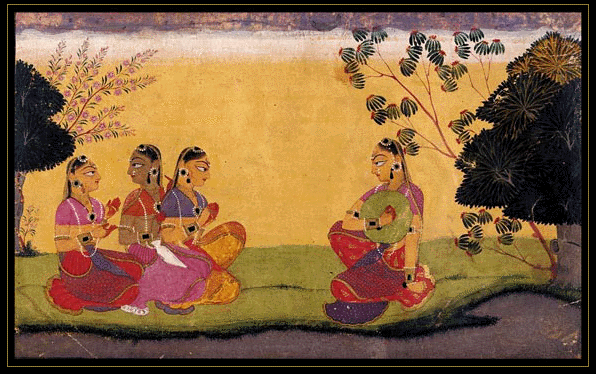
Kalavati
Kalavati's complexion is the color of yellow sandalwood and she wears garments the color of a parrot. Her husband is Kapota, the youngest brother of Vahika, and her parents are Sindhumati-devi and Kalankura-gopa, the maternal uncle of Arkamitra.
SubhangadaSubhangada is the younger sister of Visakha. She is of very fair complexion and is married to Patatri, the younger brother of Pithara.
HiranyangiHiranyangi is very dear to Srimati Radharani and Srimati Radharani is very dear to her. Hiranyangi is dressed in beautiful garments that appear like a great multitude of unparalleled blossoming flowers. Her complexion is the color of gold and she appears to be a temple or palace in which all beauty is conserved. She was born from the womb of Harini-devi. Here is the story of her conception:
Her father, Mahavasu-gopa, is pious and famous for being devoted to performing Vedic sacrifices. He is decorated with wonderful good qualities and he is the close
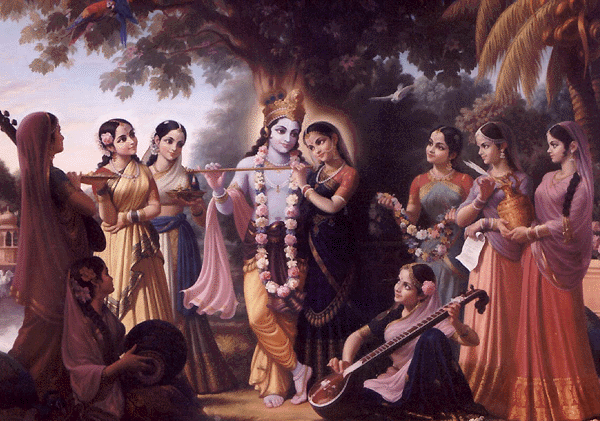
Lalita-devi
Of the varistha gopis, Lalita is the most important, being the leader and controller. She and the other eight principal gopis, the other gopis and the manjari have forms that are for the most part like the transcendental form of Srimati Radharani, the queen of Vrndavana.
Lalita is famous as Srimati Radharani's constant companion. Her complexion is like the yellow pigment gorocana and her garments are like peacock feathers. Her mother is Saradi-devi and her father is Visoka. Her husband is named Bhairava. He is a close friend of Govardhana-gopa. Her age is 14 years, 8 months and 27 days. Her home is in Yavata and her nature is vama-prakhara. In gaura-lila, she has assumed the form of Sri Svarupa Damodara Gosvami.
The beauty of all the other gopis appears to be conserved in the form of Lalita-devi. She is contrary and hot-tempered by nature. In an argument, her mouth becomes bent with ferocious anger and she expertly speaks the most outra
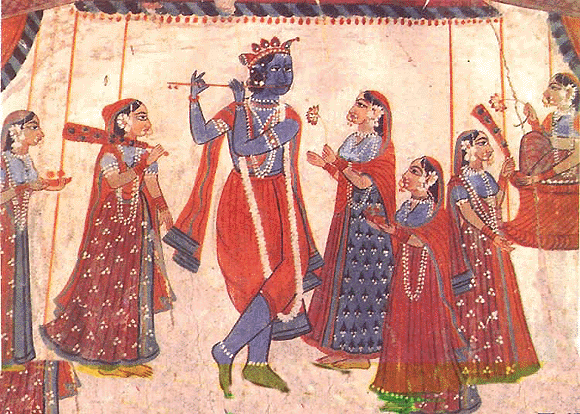
The Skanda Purana states that out of many thousands of gopis, sixteen thousand are predominant; and out of 108 gopis, eight are still more prominent; out of eight gopis Radharani and Candravalli are prominent; and out of these two gopis, Radharani is the most prominent. Because Radha possesses all the charm and sweetness, She is the better of the two.
Krsna's contemporary gopi friends, who are the most exalted of the gopis, are divided into varistha (the most exalted ) and vara (exalted). Among all the gopis the most important are Srimati Radharani, Candravali, Bhadra, Syama and Palika. These gopis are full of all transcendental good qualities. Of these gopis Srimati Radharani and Candravali are the best. Each of them has millions of doe-eyed gopi followers. Because She possesses all charm and sweetness, Srimati Radharani is the better of the two. She is supremely famous. In the Sruti-sastra She is known by the name Gandharva-devi.
The varistha gopis
The Manjaris
Rupa Manjari
In the northern part of Sri Lalita Sakhi’s kunja lies Rupollasa Kunja, where the very beautiful and graceful Sri Rupa Manjari resides. She is the foremost among the gopis known as priya-narma-sakhis. Her complexion is the color of gorocana (a bright yellow pigment secreted from a cow’s kidney), and she delights in wearing a dress the color of peacock feathers. Her age is 13 years 6 months. The panditas call her Rangana-malika. In age, she is one day younger than Lavanga Manjari. In gaura-lila she appears as Srila Rupa Gosvami.
Rati Manjari
In the southern part of Sri Indulekha’s kuñja lies Ratyambuja Kuñja, where the beautiful Sri Rati Manjari always resides. Her dress is covered with stars, her complexion is like lightning, and she is daksina-mrdvi in nature. The panditas also call her Tulasi. Her age is 13 years 2 months. In Kali-yuga, in gaura-lila, she is known as Raghunatha dasa Gosvami.
Lavanga Manjari
In the eastern part of Sri Tungavidya’s kunja lies L
Satadhanya Swami; One of the jew poisoners escaping attention, but no more;
ELEVEN TOLAS OF TOXIN
In our previous article entitled- "Machiavellian", we mentioned how Tamal Krsna Goswami (TKG), had surrounded himself with a 'coalition of the compromised': those who appeared in public as powerful leaders, elite among men, and promoted by him (TKG) to be no less. For years following the departure of ISKCON's Acarya, Srila Prabhupada, rank-and-file visitors to the holy dham, were given public exhibitions of ecstatic bliss, theatrically displayed by this group of 'eternal associates'. We watched in complexed inferiority as they danced and pranced, eyes closed, intoxicated with love of God. Postulants swooned as this confrere walked the 'guru': with chin up, right hand in bead bag and left hand fanning the rear end with each majestic stride. Ever so often, one would stop by the other, say something quiet and meaningful, evoking a loving response peppered with dignified laughter or warm smil

AC Bhaktivedanta Swami Prabhupada - Founder Acharya of ISKCON (International Society for Krishna Consciousness).
His Divine Grace A.C. Bhaktivedanta Swami Prabhupada appeared in a family of pure Gaudiya Vaisnavas in 1896 in Calcutta. From early childhood he showed signs of pure devotion to Lord Sri Krishna. At the tender age of five, he single-handedly organized a neighborhood Ratha-yatra festival to glorify Lord Jagannatha. He authentically decorated a small cart to resemble the Lord's colossal chariot in Puri. Besides leading the kirtana party, he organized cooking and prasadam distribution. With his enthusiasm and ecstatic love for Lord Krishna he engaged the community in chanting:
Hare Krishna Hare Krishna Krishna Krishna Hare Hare,
Hare Rama Hare Rama Rama Rama Hare Hare.
Unlike other children his age who would waste their time playing, Srila Prabhupada preferred to visit the local Radha Krishna temple. For hours together, he would lovingly gaze upon the transcendental forms o